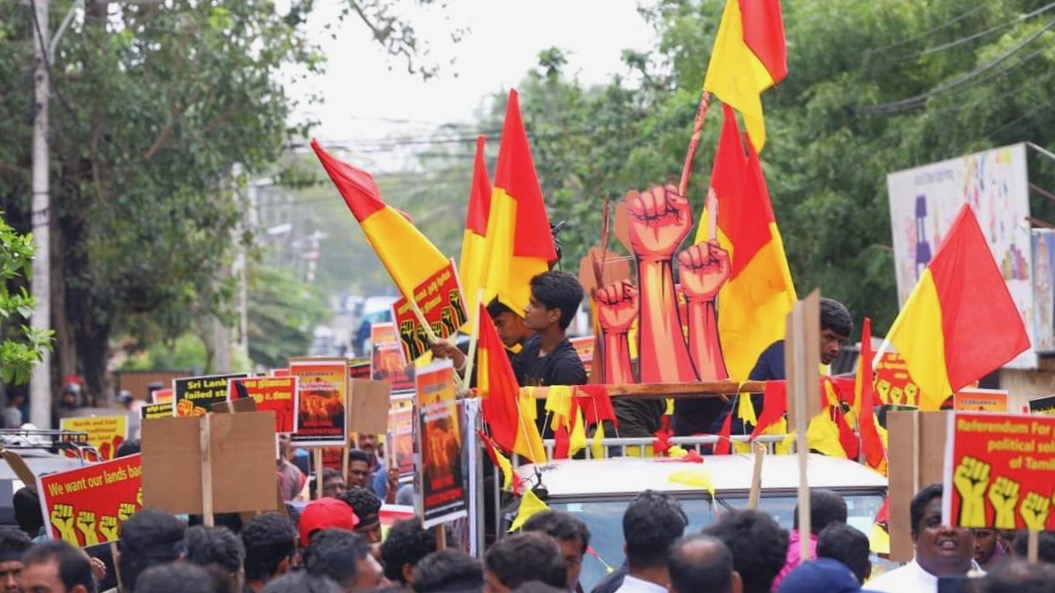On February 11, the Tamil National People’s Front (TNPF) and students of Jaffna University in Sri Lanka staged a protest against a musical event organized by the secretariat of President Ranil Wickremesinghe in Jaffna as part of Sri Lanka’s 75th Independence day celebrations.
At least 18 protestors, including Selvarajah Kajendren, Member of Parliament and General Secretary of the TNPF, were arrested at the protest. They were later released on bail.
On Saturday, February 4, a massive rally was organized in Sri Lanka’s Northern and Eastern provinces to observe a “Black Day” in the Tamil-dominated region. February 4 is also Sri Lanka’s Independence Day. The north to east rally began in Jaffna on Saturday and ended on Monday, February 7, in Batticaloa in the Eastern province.
Jaffna University students protested outside the university premises on February 7. Black flags were hoisted in the campus, highlighting the decades-long oppression and marginalization faced by the country’s Tamil population. Business owners and shops in Jaffna carried out a hartal (shutdown) on the day in solidarity with the protesters.
In Batticaloa, a ‘Black Independence Day’ event was organized by the Ilanakai Tamil Arasu Katchi (ITAK) on Monday. Tamil National Alliance (TNA) MPs M A Sumanthiran and Shanakiyan Rasamanickam led the protest march in Batticaloa. “All Sri Lankans haven’t received independence in terms of financial stability. Tamils also don’t have political independence,” said Rasamanickam.
Similar protests had been held in Jaffna earlier this year, on January 15, during President Ranil Wickremesinghe’s trip to the Northern province during the Pongal festival. The protests, organized by the Missing Persons Organization and the Jaffna University Students Union, demanded government action with respect to the thousands of missing persons from the region, as well as an end to military occupation of their lands. The protesters also called on the government to release all Tamil political prisoners.
Justice for victims of enforced disappearances
The Tamil population in Sri Lanka has been demanding justice for those subjected to ‘enforced disappearance’ by security forces during the decades-long civil war and an end to military occupation of Tamil areas—a demand that has been raised since the end of the civil war in 2009.
The 26-year civil war between the separatist Liberation Tigers of Tamil Eelam (LTTE) and the Sri Lankan government had its roots in the divide-and-rule policy of the imperial powers in Sri Lanka, leading to tensions between Tamil and Sinhala groups. Between 1983 and 2009, countless people died on both sides. The last phase of the war saw the Sri Lankan government under then President Mahinda Rajapaksa launched a massive offensive which led to the deaths of thousands of Tamilians, as well as mass displacement and human rights violations.
Thousands of Tamils youth were forcibly disappeared in army custody, according to Human Rights Watch. According to the UN Working Groups of Enforced Disappearances, Sri Lanka has the second largest number of cases related to enforced disappearances. An estimated 100,000 individuals were subjected to enforced disappearances during the deadly civil war, according to the advocacy group People for Equality and Relief in Lanka.
The Sri Lankan military continues to occupy predominantly Tamil areas, designated as “high-security zones,” though to a lesser extent than during the war.
Wickremesinghe government criticized over expensive I-day celebrations
Sri Lanka achieved its independence from the British on February 4, 1948. This February, the country celebrated its 75th Independence day, but sentiments were varied as the crippling economic crisis, which escalated in 2022, continues to wreak havoc on people’s lives.
The cost of the government ceremony to mark the day was an estimated LKR 200 million (USD 542,411). The decision to spend this amount of public money at a time of acute economic crisis provoked widespread criticism within the country and abroad. The main opposition party, Samagi Jana Balawegaya, boycotted the celebrations at Galle Face in Colombo, along with a number of other political parties.
The celebrations were to take place under tight security at Galle Face—the site of massive anti-government argalaya protests last year. On February 3, the police violently assaulted peaceful protesters and arrested four people at a non-violent sit-in organized in Maradana suburb on the eve of the celebrations.
In a series of Tweets, international watchdog Amnesty International South Asia stated that “not for the first time, Sri Lanka Police [has] used unnecessary and unlawful force against peaceful protesters, in total violation of the people’s right to peaceful assembly,” adding that “footage seen by Amnesty shows the police using tear gas, and water canons at high pressure to disperse peaceful protesters. Further, the police is seen using batons punitively when conducting arrests.”
Amnesty also said it was “alarmed to hear that lawyers were denied access to those arrested in contravention of due process safeguards guaranteed under international law.” It stated that the “authorities must at all times protect the right to peaceful protest, and respect due process rights.”





